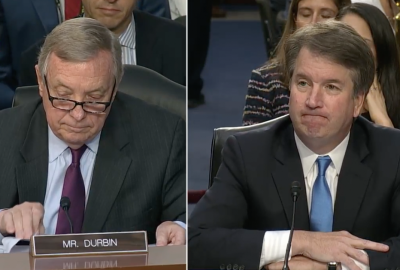The Problem With Judicial Nominations? The Left Doesn't Actually Want to Follow the Constitution

Linus, from the Peanuts cartoon, once famously declared, "I love mankind ... it's people I can't stand!"
We could sum up the attitude of the Left toward the American political system with a similar statement: "I love democracy ... it's the Constitution I can't stand!"
That is the opinion that is apparent from some of the reactions to President Trump's nomination of Brett Kavanaugh to fill the seat of the now retired Justice Anthony Kennedy on the U. S. Supreme Court.
For example, the Advocate, a leading LGBT news site, ran an article with the sub-headline, "Kavanaugh is a conservative who has pledged to interpret law as written. His record shows reason for concern."
Saying that a judge pledging "to interpret law as written" is "reason for concern" is strange. What is really "reason for concern" is a judge who interprets the law any other way—because that is a recipe for judicial tyranny.
The remainder of the article (by Trudy Ring) makes clear that Judge Kavanaugh failing to fulfill this pledge is not the "concern." For example, Ring laments that "Trump has said he would appoint justices who would overturn the Roe v. Wade ruling that established abortion rights nationwide..." But courts are not supposed to "establish" rights at all—only recognize and apply those that have already been "established" by the Constitution or by statute.
The most crucial corrections of the Constitution's original imperfections—such as abolishing slavery and giving women the right to vote—were accomplished through the Constitution's own amendment process, not through judges acting unilaterally to "establish" new rights.
Ring cites Rachel B. Tiven, chief executive officer of Lambda Legal (an LGBT legal advocacy group) as saying, "We have good reason to fear that Judge Kavanaugh will abuse his power on the Court . . . while depriving LGBT Americans of our dignity, demeaning our community, and diminishing our status as equal citizens."
Note, however, that the concepts of "dignity" (a favorite of now retired Justice Kennedy) and "community" appear nowhere in the text of the Constitution. The focus on "equal citizenship" of LGBT Americans is simply a talking point; for they retain the same rights granted to everyone (including every LGBT or non-LGBT American) by the text of the Constitution. Contrary to LGBT claims, the marriage debate was about the definition of marriage—which the Constitution leaves to the states—not about "equal" access to it.
Jay Michaelson, writing for The Daily Beast, tried to delve deeper into issues of judicial philosophy. Michaelson zeroed in on a quote from Leonard Leo of the Federalist Society, the group that helped President Trump compile his list of potential Supreme Court nominees. Leo had noted that Kavanaugh has demonstrated "a commitment to interpreting the Constitution as it's written, and enforcing the limits on government power contained in the Constitution."
Here is Michaelson's take:
. . . Leo's statement is a dog-whistle to conservatives. "Interpreting the Constitution as it's written" means that substantive due process, the doctrine underneath Roe, Obergefell —and even Griswold v. Connecticut, which forbids the government from banning contraception — is illegitimate. That means all those cases are on the chopping block.
It is ironic that Michaelson uses the term "dog whistle" to describe an approach of plainly stating up-front a plain desire to follow the plain words of the text, as opposed to his support for "mystery of life" case law. Regardless, both the Fifth and Fourteenth Amendments to the Constitution state that no person may be deprived "of life, liberty, or property, without due process of law." Some more conservative legal scholars see this as emphasizing the legal "process," and thus providing only procedural protections. However, other (primarily liberal) scholars and Supreme Court justices argue that the "liberty" mentioned in the clause may be interpreted broadly as giving protection to "substantive" rights that are not elsewhere enumerated in the Constitution.
"Privacy" is one such "substantive" right that the Supreme Court has identified, and used in part as the foundation for Roe (striking down laws against abortion), Obergefell (requiring same-sex couples be permitted to "marry") and Griswold. Yet the text of the Constitution nowhere includes a free-standing "right to privacy."
A true originalist will follow the Constitution, wherever it leads him or her. But liberals are used to using whatever they can to push their desired policies, and the fact that the Left is so alarmed by the idea of "interpreting the Constitution as it's written" shows their underlying contempt for the foundational document of our political system.



























